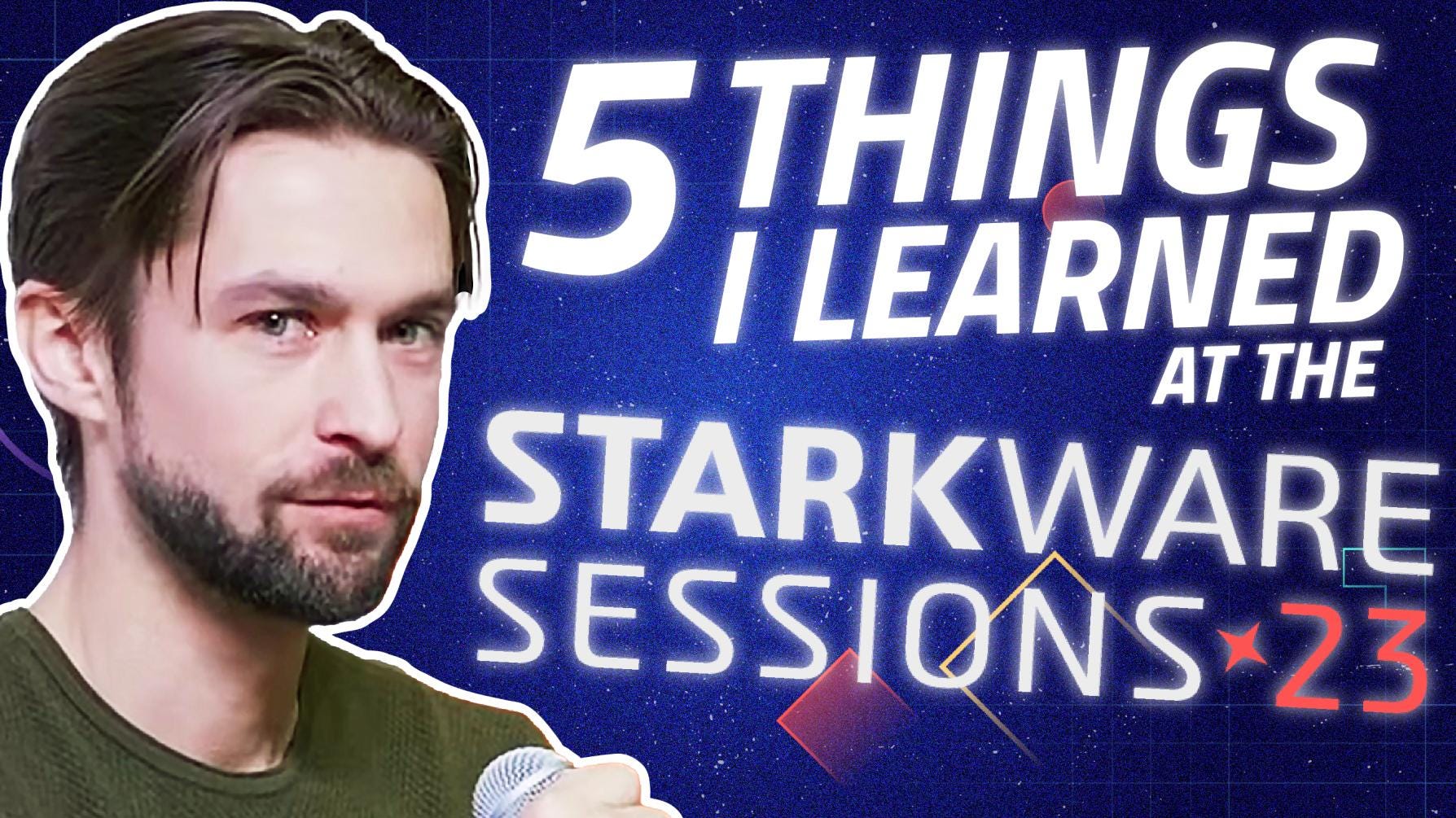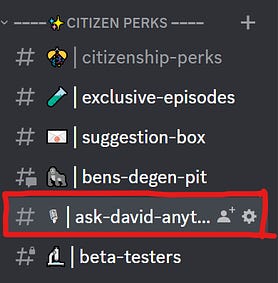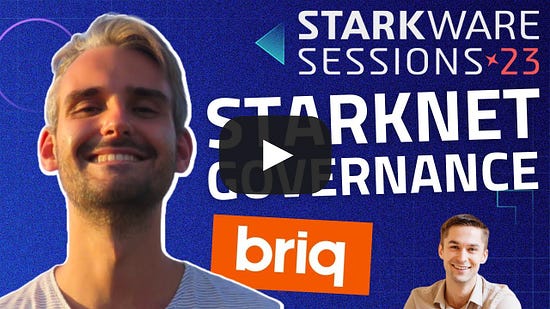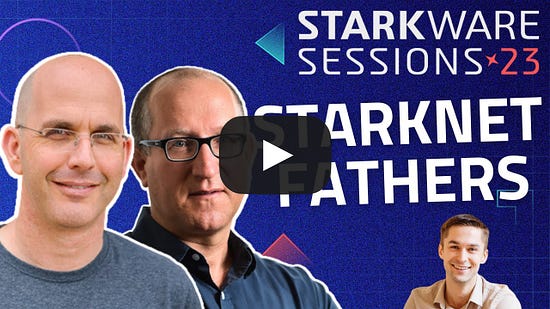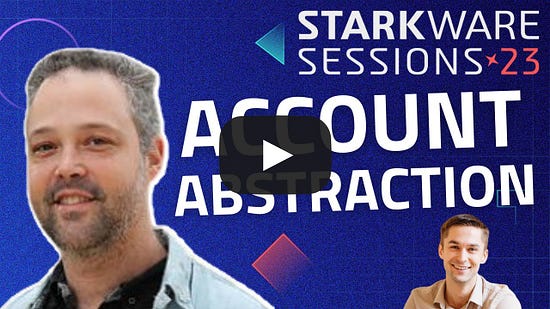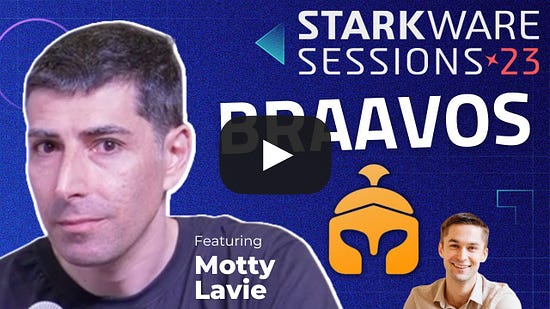5 Things I Learned at StarkWare Sessions
5 Things I Learned at StarkWare SessionsCan’t make it to every crypto conference? Don’t worry, Bankless brings the frontier to you.
Web3 has a steep learning curve. MetaMask Learn is a free-to-use education platform available in 10 languages to help you get started with basic Web3 topics and concepts. Dear Bankless Nation, Last Friday, I hopped on a plane to Tel Aviv to attend StarkWare Sessions, a two-day conference where StarkWare and the Starknet ecosystem would come together and talk. Of course, I brought an entire podcast studio with me, and I recorded a total of nine interviews with founders, builders, and developers in the Starknet ecosystem. My goal was simple: To learn as much as possible about the frontier of Stark-land, and bring all that I discovered back to the Bankless Nation (in content format, of course 😉) – David Hoffman 🙏 Together with 🦊 MetaMask Learn 🦊MetaMask Learn is an educational resource to help people understand what web3 is, why it matters, and how to get started. While you may understand core concepts of this decentralized technology, many don’t—consider adding MetaMask Learn to your onboarding guides if you’re a dapp developer or NFT creator to give your community the welcome they deserve. 5 Things I Learned at StarkWare Sessions
I wanted to go to the StarkWare Sessions because my understanding of the StarkWare ecosystem is not as strong as it is of other parts of Ethereum. This should make sense, as much of what makes up Stark-world is custom-built to replace components that other L2s simply borrow from Ethereum. For example, Starknet has its own custom developer language, Cairo, and its own custom virtual machine, Cairo-VM. This fragments the Ethereum and Starknet developer communities and has created a larger chasm between these two networks compared to other L2s. Here’s what I wanted to learn:
Did I get all my questions answered? Yes, and so much more. Some quick definitions: StarkWare: The centralized commercial entity, founded by Uri Kolodny and Eli Ben-Sasson, focusing on developing STARK-proof technology (aka, scaling) Starknet: The aspiring decentralized network, built by StarkWare and the Starknet foundation, that leverages STARKs along with the rest of the components that make a blockchain. I wasn’t expecting to see how strong the culture is in the Starknet community. It was immediately obvious that we are watching a network-state blossoming before our very eyes, albeit it’s still so, so young. Starknet is a baby. It’s still trying to learn to stand itself up, let alone walk. But the energy and ownership that I felt from the Starknet community have made me optimistic that to-be stewards will rise to support the growth of this young ecosystem and left me with a feeling of pride that something like this is even possible in crypto. The 9 interviews I conducted at StarkWare Sessions are being processed by the Bankless Podcast Team (PodSquad✊), and will be batched-released on the RSS feeds and YouTube. Some interviews are directly referenced and embedded in this article!🚀 At Bankless, it’s our job to bring the frontier of crypto to you, in a fun and digestible format 😊. I have a ton of fun flying around the world, talking to cool people, and bringing those conversations back to help the Bankless Nation stay up to speed with the crypto-frontier. If you have any questions for me about my experiences at the StarkWare Sessions, feel free to drop me a question in the Bankless Nation Discord channel! It’s one of the many perks of being a Citizen of the Bankless Nation; you can chat with me and the rest of the team directly 😉 Unlock the Bankless Nation Discord Without further ado, here are five things I learned at StarkWare Sessions:1. Starknet-work State 🌎I landed in Tel Aviv on Saturday morning, dropped my bags, and walked over to the Hacker House, where hundreds of developers were being housed, fed, and wifi’d for days leading up to the event. I watched devs present their gadgets to fellow devs, and it gave me a chance to get the lay of the land for what was being built. Not long after I arrived, two members of the Starknet Foundation lead a ‘Governance Workshop’, aka sitting in a circle and giving the current state of affairs for Starknet community governance. Foundation ‘members’ might be too strong a label, as both seemed more like community volunteers who decided to take on the challenge of liaising between the Starknet devs and Starknet Foundation. Listening to the workshop, it was obvious we are in the earliest of days of Starknet governance. We are watching a baby being birthed. It’s learning how to have a voice. It’s figuring out how to stand up. It’s learning it’s alive. The cool thing is that Starknet seems to have a large supply of devs who appear engaged and interested in being a part of the process. It seems for now, the Starknet governance blocs are mostly protocol devs (perhaps the ‘core devs’ of Starknet), with the Cairo developer community having a strong but minority presence (for now). While hanging out with the devs, I caught a vibe of “this is our network”. I think the realization of “I can own the thing I’m building on” is slowly dawning on some Starknet developers. Optimism and excitement were plentiful, but I also felt a sense of intimidation about the level of responsibility that is slowly going to be asked of the surrounding community. The eventual goal of Starknet is to be a fully decentralized and community-operated machine, yet the Starknet community itself is still so nascent. There’s much to be done. Nevertheless, the crypto community doesn’t back down from a challenge, and the solutions don’t all need to come at once. The Starknet community seems poised to answer the call 🫡 2. Starknet is largely Ethereum-independent 🧍♂️If you’ve been in Ethereum a while (and have been paying attention to the chain-alignment tribal-warfare games) you’ve probably noticed the larger gap between StarkWare and the greater Ethereum ecosystem. This should make sense from a technological perspective. Starknet is largely an independent piece of technology from Ethereum. It really just uses Ethereum as a data-layer (although Starknet will also be composable with Ethereum assets too). You could, in theory, settle Starknet on any L1, because StarkWare has built a piece of technology that is self-optimized. This has triggered some of the ‘ETH-maxi’ types in various ways, and I’ll admit I’ve felt that misalignment with StarkWare in the past — how dare you not use the EVM!? Not to mention the perhaps questionable choices of investors (3AC, Alameda, Multicoin). I knew I had this bias, so I wanted to take this opportunity of attending this event to look at it from the StarkWare perspective. Even before coming to Tel Aviv, I had heard many positive things about the ways StarkWare has engaged with their ecosystem developers — the common theme of feedback was that devs felt heard by StarkWare about development choices for Cairo and Starknet. It became obvious that the choice to break from Ethereum’s network effects and build a ground-up, self-optimized ecosystem was the right choice. After learning more about the choices of Cairo and the technologies that Uri and Eli have pioneered, the logic all came together. SNARKs and STARKs are crazy awesome technologies, and the best versions of themselves deserve to be expressed. StarkWare seems to be furthest along at realizing these technologies to their fullest. I watched Eli and Uri begin StarkWare Sessions with an opening talk, and had the chance to interview them afterward. These two pioneers of math and cryptography have become world-builders. Hear my interview with Eli and Uri below: 3. Cairo might be less of a burden than I thought 🪨Knowing my own bias as an EVM-maxi, I wanted to use StarkWare Sessions to check my understanding of the developer experience around Cairo. What’s Cairo? Cairo is a custom-built programming language for the StarkWare ecosystem. One theme I noticed is that the StarkWare ecosystem has optimized for itself, where other L2s have optimized for Ethereum. The ethos of StarkWare and Starknet is that Starknet wants to be the best version of itself, and that includes building a coding language from the ground up to maximally enable the best expression of StarkWare’s tech. While this sacrifices the ability to draft in Ethereum’s network effects, it’s still hard to argue with this design choice, especially now that it’s obvious that Cairo’s own network effects have already reached escape velocity (and likely did so a long time ago). Additionally, there is also Solidity<>Cairo bridging efforts in teams that are building developer-middleware between these two systems, like Kakarot. I sadly did not interview the Kakarot team (I’m not sure I’d be much use here 😅), but they gave a presentation at the event which you can watch when it’s uploaded. 4. Smart Contract Wallets 🤝 L2sSmart Contract Wallets (SCWs) and ‘Account Abstraction (AA)’ are largely synonymous terms. Everyone agrees: account abstraction is one of the many bad names found in crypto. Another one is “EOA: Externally-Owned Account”, which also happens to be the type of wallet that Smart Contracts Wallets aren’t. All wallets on Ethereum are one of two types: EOAs or SCWs. The wallet you use is probably an EOA. Ledger, Metamask, Phantom, Coinbase Wallet… about 99% of wallets in use today are EOA wallets. What’s a Smart Contract Wallet? The power of Account Abstraction (what enables SCWs to exist) is difficult to express; its potential is quite literally endless. What Bitcoin is to Externally-Owned Accounts, Ethereum is to Smart Contract Wallets. Your Ledger, Metamask, or whatever EOA you probably use is a dumb wallet. It does one thing, and one thing only, which is sign messages. A SCW is a turing-complete wallet. Like how Ethereum lets us combine money and software, AA lets us imbue our wallets with software too. The UX upgrades that SCWs will bring to crypto will eliminate so much of what makes crypto wallets difficult and unintuitive. AA unlocks an entirely new design landscape that is itself its own zero-to-one moment. There were two main SCWs teams present at StarkWare Sessions: I was an early power user of L1 Argent app, but as soon as Ethereum’s 1-gwei gas fee paradigm ended in late 2019, it became obvious that L1 SCWs were not going to work. Why? Imagine Ethereum’s worst kinks in 2021—high gas fees, failed mints, confusing UX — now 10x it. That’s because Ethereum doesn’t have Account Abstraction enabled at the L1. Yoav Wiess is a security researcher at the Ethereum Foundation and has been leading the charge behind ERC-4337, which aims to bring Account Abstraction to the Ethereum L1. In order to learn about AA and SCWs, I encourage you to watch my interview below with Yoav! Meanwhile, the frontier of SCW innovation has been on L2s for a long time now, specifically zkL2s. Why specifically zkRollups, and not Optimistic Rollups (ORUs)? ORUs like Optimism and Arbitrum are trying to be Ethereum equivalent. And since Ethereum doesn’t have AA enabled, neither do our current crop of ORUs. Right now, 99% of all wallets are EOAs. SCW proliferation will go: ZK-Rollups → ORUs → Ethereum L1 This is one of the many reasons why crypto-innovation will always be on the L2 frontier; L2s can adapt and innovate faster than the L1. They can also accelerate the integration of L2 EIPs at the L1 level, as L2s produce production-level testnets for EIPs like AA. Read more about this phenomenon here. If you want to hear the Founder and CEO of Braavos talk about SCWs on Starknet, check out my interview with him below. P.S. I hope you enjoyed the comical level of acronym usage in this section. This is how you can tell we have lots of abstraction left to do before crypto reaches mass adoption. 5. zk-Rollups don’t use Zero Knowledge Proofs 😦Yep. I remember learning this once a long time ago, but have since forgotten about this fun fact in the chaos of crypto. 
DavidHoffman.bedrock 🏴🦇🔊🏴 @TrustlessState
Fun fact: zk rollups do not use zero-knowledge proofs Complete misnomer. They’re actually ‘validity rollups’. Zk has nothing to do with it. 🤦
2:01 PM ∙ Feb 7, 2023
142Likes11Retweets
ZKPs are specifically about hiding knowledge. Any ZKP is also a validity proof, but ZKPs also hide information along the way. Most “zk-rollups” are actually validity rollups ¯\_(ツ)_/¯ ✨The more you know✨ Action stepsSubscribe to Bankless. $22 per mo. Includes archive access, Inner Circle & Badge. 🙏 Thanks to our sponsor MetaMask Learn👉 Add MetaMask Learn to your onboarding guides for your community ✨ Not financial or tax advice. This newsletter is strictly educational and is not investment advice or a solicitation to buy or sell any assets or to make any financial decisions. This newsletter is not tax advice. Talk to your accountant. Do your own research. Disclosure. From time-to-time I may add links in this newsletter to products I use. I may receive commission if you make a purchase through one of these links. Additionally, the Bankless writers hold crypto assets. See our investment disclosures here.
Read Bankless in the app
Listen to posts, join subscriber chats, and never miss an update from David Hoffman.
© 2023 Bankless, LLC. |



